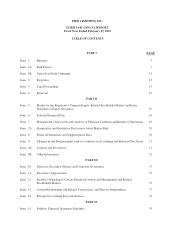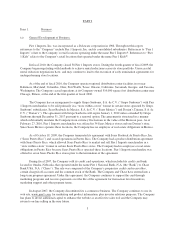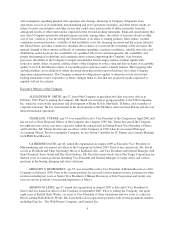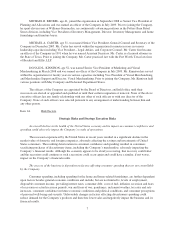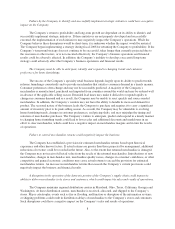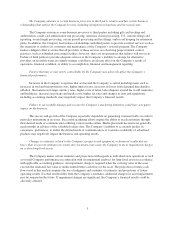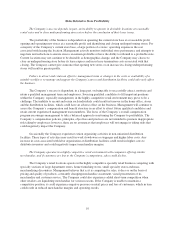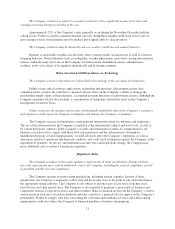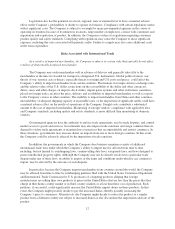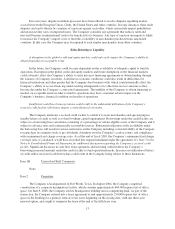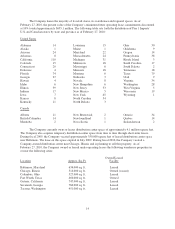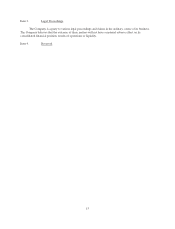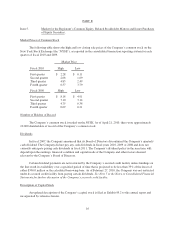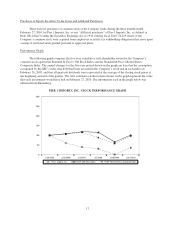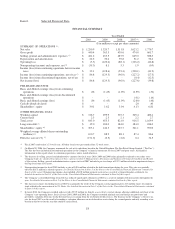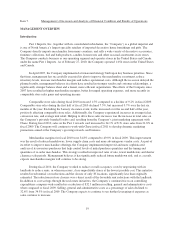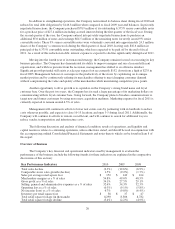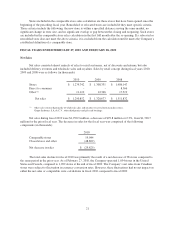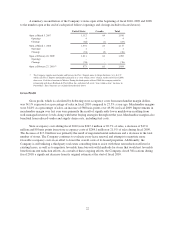Pier 1 2010 Annual Report Download - page 18
Download and view the complete annual report
Please find page 18 of the 2010 Pier 1 annual report below. You can navigate through the pages in the report by either clicking on the pages listed below, or by using the keyword search tool below to find specific information within the annual report.Legislation also has the potential on a local, regional, state or national level to have a material adverse
effect on the Company’s profitability or ability to operate its business. Compliance with certain legislation carries
with it significant costs. The Company is subject to oversight by many governmental agencies in the course of
operating its business because of its numerous locations, large number of employees, contact with consumers and
importation and exportation of product. In addition, the Company is subject to regulations regarding consumer
product quality and safety standards. Complying with regulations may cause the Company to incur significant
expenses, including the costs associated with periodic audits. Failure to comply may also cause additional costs
in the form of penalties.
Risks Associated with International Trade
As a retailer of imported merchandise, the Company is subject to certain risks that typically do not affect
retailers of domestically produced merchandise.
The Company may order merchandise well in advance of delivery and generally takes title to the
merchandise at the time it is loaded for transport to designated U.S. destinations. Global political unrest, war,
threats of war, terrorist acts or threats, especially threats to foreign and U.S. ports and piracy, could affect the
Company’s ability to import merchandise from certain countries. Fluctuations in foreign currency exchange rates
and the relative value of the U.S. dollar, restrictions on the convertibility of the dollar and other currencies,
duties, taxes and other charges on imports, dock strikes, import quota systems and other restrictions sometimes
placed on foreign trade can affect the price, delivery and availability of imported merchandise as well as exports
to the Company’s stores in other countries. The inability to import merchandise from China and other countries,
unavailability of adequate shipping capacity at reasonable rates, or the imposition of significant tariffs could have
a material adverse effect on the results of operations of the Company. Freight costs contribute a substantial
amount to the cost of imported merchandise. Monitoring of foreign vendors’ compliance with applicable laws
and Company standards, including quality and safety standards, is more difficult than monitoring of domestic
vendors.
Governmental agencies have the authority to enforce trade agreements, resolve trade disputes, and control
market access to goods and services. Governments may also impose trade sanctions on foreign countries that are
deemed to violate trade agreements or maintain laws or practices that are unjustifiable and restrict commerce. In
these situations, governments may increase duties on imports from one or more foreign countries. In this event,
the Company could be adversely affected by the imposition of trade sanctions.
In addition, the governments in which the Company does business maintain a variety of additional
international trade laws under which the Company’s ability to import may be affected from time to time,
including, but not limited to, antidumping laws, countervailing duty laws, safeguards laws, and laws designed to
protect intellectual property rights. Although the Company may not be directly involved in a particular trade
dispute under any of these laws, its ability to import, or the terms and conditions under which it can continue to
import, may be affected by the outcome of such disputes.
In particular, because the Company imports merchandise from countries around the world, the Company
may be affected from time to time by antidumping petitions filed with the United States Commerce Department
and International Trade Commission by U.S. producers of competing products alleging that foreign
manufacturers are selling their own products at prices in the United States that are less than the prices that they
charge in their home country market or in third country markets or at less than their cost of production. Such
petitions, if successful, could significantly increase the United States import duties on those products. In that
event, the Company might possibly decide to pay the increased duties, thereby possibly increasing the
Company’s price to consumers. Alternatively, the Company might decide to source the product or a similar
product from a different country not subject to increased duties or else discontinue the importation and sale of the
product.
12


